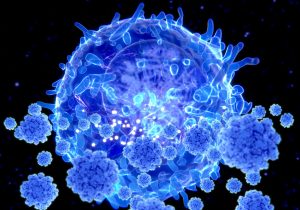A recently published article by Dr. Lawrence Afrin, the author of Never Bet Against Occum: Mast Cell Disease and the Modern Epidemics of Chronic Illness and Medical Complexity, and two other mast cell doctors, have found a consistency of symptoms of Mast Cell Activation Syndrome (MCAS) and those of “long-haul COVID-19”. They also postulate that those patients with severe COVID-19 symptoms of hyperinflammatory cytokine storms may in fact have undiagnosed MCAS, a chronic multisystem inflammatory disease.
If you are not familiar with the illness of Mast Cell Activation Syndrome, it is a beast of an illness to live with and to diagnose, mainly because the symptoms can look like so many other illnesses. (I have written a series of informational articles about MCAS here. )
For some people, the symptoms of MCAS aren’t enough to actually seek medical care. They may have an occasional stomach ache, or rash, and have never needed to become a detective to determine why they were able to eat blueberries, for example, last month and this month their stomach hurt horribly after eating them. Or the few hives that they get in the autumn season aren’t enough to bother them. Yet underlying these symptoms and others, the body’s mast cells are overreactive, while the person will declare themselves perfectly healthy. Then, when the body begins to fight off a virus such as COVID-19, the body overcompensates its response to the viral load and releases thousands of chemicals (cue the cytokine storm) that end up doing more damage to the body than the virus itself.

SARS-CoV-2-Reactive T Cells Found in Patients with Severe COVID-19
Recent statistics regarding COVID-19 suggest that only 15-20% of patients will experience a severe form of the illness. It is interesting to note that previous research on the prevalence of MCAS in the developed world is 17%, with the abundance of individuals unaware that the symptoms they are experiencing are in fact from mast cells acting abnormally.
Any virus would call forth a response by mast cells in order to heal the body. The problem with MCAS individuals who remain undiagnosed and therefore untreated, is that their mast cells are dysfunctional and react inappropriately to COVID-19 causing thousands of chemicals to be released into the body.
Fatal cases of COVID-19 are frequently caused by cardiovascular conditions, and heart damage has been one of the frequently cited long-term affects of the illness. Mast cells play a significant role in cardiovascular complications seen with COVID-19 such as pulmonary embolisms. Additionally, mast cells patients frequently cite “brain fog” as one of their symptoms, a common complaint of long-haulers with COVID-19.
Fatigue is a classic symptom of MCAS, frequently made worse by insomnia. Once again, these are common complaints of individuals who are still experiencing symptoms months after being diagnosed with COVID-19. In the research report, the doctors provide a table of symptoms by organ/system comparing MCAS with COVID-19 patients. The similarities are striking.
For individuals in the midst of the virus, doctors are finding that medications used to mitigate the symptoms of MCAS, inhibiting mast cell activation, are also helping COVID-19 patients: cromolyn; leukotriene inhibitors, dexamethasone, low-dose naltrexone, quercetin, and H1 and H2 blockers (antihistamines such as Zyrtec and Pepcid). These drugs might mitigate the severity of the illness, helping patients to not progress to the severest form of the disease.
An interesting note in the article concerned MCAS patients who had been previously diagnosed and were being treated for their mast cell activation. When these patients tested positive for a COVID-19 infection, all fared well enough that the doctors stated that “none have required mechanical ventilation, let alone died”. Their conclusion was that the patients had their mast cells at least partially controlled so that they did not suffer the most severe courses of the disease, but that they were still at increased risk for suffering from the post-COVID-19 illness.
For those of us with a diagnosis of MCAS, the volume of research that is currently occurring on COVID-19 will undoubtedly help us to have more understanding of our illness. And hopefully, a cure!
You can read the full article, Covid-19 hyperinflammation and post-Covid-19 illness may be rooted in mast cell activation syndrome in the International Journal of Infectious Diseases.